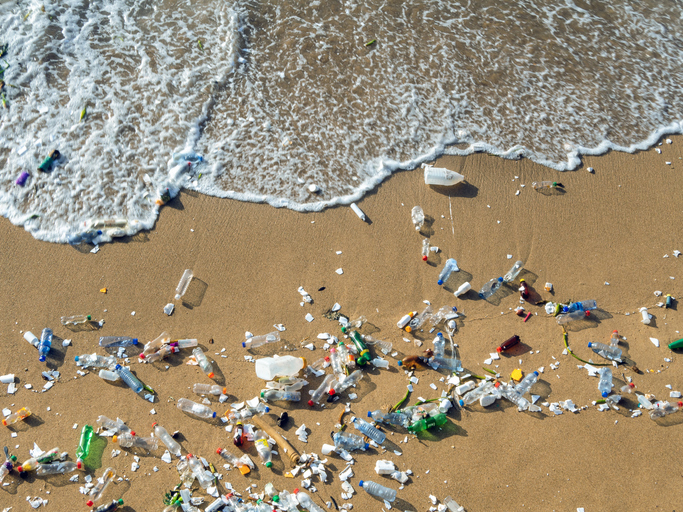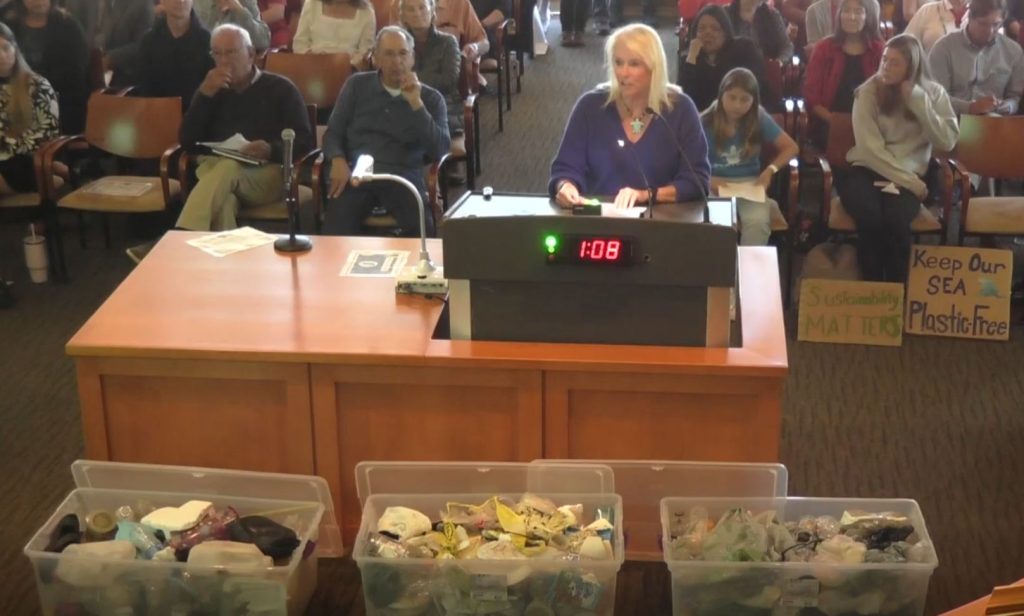
The Coronado City Council will consider adopting a single-use plastic reduction ordinance later this year.
“Coronado can clearly do better,” said Council Member John Duncan, who submitted a Policy No. 2 request to bring the matter before the council for discussion. “We really have no restrictions in place. We are surrounded by water, and there’s a lot that needs to be cleaned up.”
City staff is currently compiling a report that will be presented to the council in the coming months, which will outline various options for a potential plastic reduction ordinance.
In March, students spoke before City Council, imploring them to adopt a policy that would restrict plastic waste in the city.
“I urge you to listen to the voices of our young people,” said Amy Steward, president of Emerald Keepers, a nonprofit organization that advocates for environmental issues, at an April 16 City Council meeting. “They are the future of Coronado.”
Steward placed three large bins of plastic waste that 39 volunteers picked up in an hour at the Coronado Ferry Landing to illustrate her point.
“There’s a lot of plastic on our beaches, and much of it is single-use plastic,” Steward said. “And of course, we didn’t even come close to picking it all up.”

Most coastal cities in San Diego County have already passed plastic reduction ordinances.
“Our oceans are choking in plastic,” Steward said.
Despite many plastic products being labeled as recyclable, only 5 to 6 percent of plastics are actually recycled, according to The MIT Technology Review.
Even plastics that are put into recycling bins and taken to recycling centers often end up in landfills because they do not meet the standards that allow for recycling. Plastics (and other recyclable materials) must be clean to be recycled, but cleaning them also has an environmental cost of water and chemical use. In the past, the United States would ship its recycling to China, which also carries environmental costs. Sometimes, those materials are landfilled instead.
Environmental economist Thomas Kinnaman argues that recycling plastic often is worse for the environment than landfilling it is after all the externalities are taken into account. Recycling metals and glass, he says, does have a net positive impact on the environment.
Rather than pushing to recycle, whose flaws are well documented, many environmentalists say that plastic reduction is key.
But some argue that plastic reduction ordinances put the onus of protecting the environment on individuals when large corporations are the ones doing the most environmental damage and should be held accountable.
And plastic reduction ordinances can have unintended consequences. California was the first state to ban single-use plastic bags. A decade later, plastic bag waste has increased in the state, not decreased.
A loophole in the state statute allows stores to charge consumers for reusable plastic bags, which are made of much thicker plastic than the bags used before the ban were. A state study found that in 2004, the amount of plastic bags trashed per person in California was 8 pounds.
In 2021, that number had increased to 11 pounds per person, per year. A proposed new law would ban all plastic bags outright starting in 2026, if passed.
The recycling debate hinges on tallying up myriad consequences – intended or not – and choosing the best option.
For example, reusable cotton shopping bags are worse for the environment than plastic bags are, once their high production costs are accounted for, according to a United Nations Environment Programme report. Consumers would have to use a cotton shopping bag up to 150 times to make up for the higher environmental impact it carries over single-use plastic – if the bag holds up that long.
But it’s not that simple: Plastic waste harms marine life and contributes to microplastics in the environment, which carry negative health implications. Is using more water and power to create the cotton bag worth the reduction in other negative environmental consequences? Many, if not most, environmentalists say yes, but the example illustrates how lawmakers and environmentalists must weigh causal sequence in determining policy.
Duncan said he hopes the city will adopt some kind of reduction ordinance, but that he wants to be mindful about how its implementation impacts businesses. For example, he said, allowing hotels and small businesses to delay adoption of an ordinance would help cushion the financial blow that would arise from having to simply discard potentially noncompliant packaging.
“I’m 100% for a plastic reduction ordinance,” Duncan said. “But I also want to ensure that the ordinance is reasonable and fair.”
Duncan said that he and his colleagues on the City Council want to hear people’s opinions on the matter ahead of their deliberations. The discussion on potential plastic reduction ordinance has not yet been scheduled, but residents can voice their opinions in public comment at regular council meetings or by emailing their council members.
“We want people’s input on this matter,” Duncan said. “I encourage everyone to bring their thoughts or concerns to council so we can consider all perspectives before we have a discussion.”




